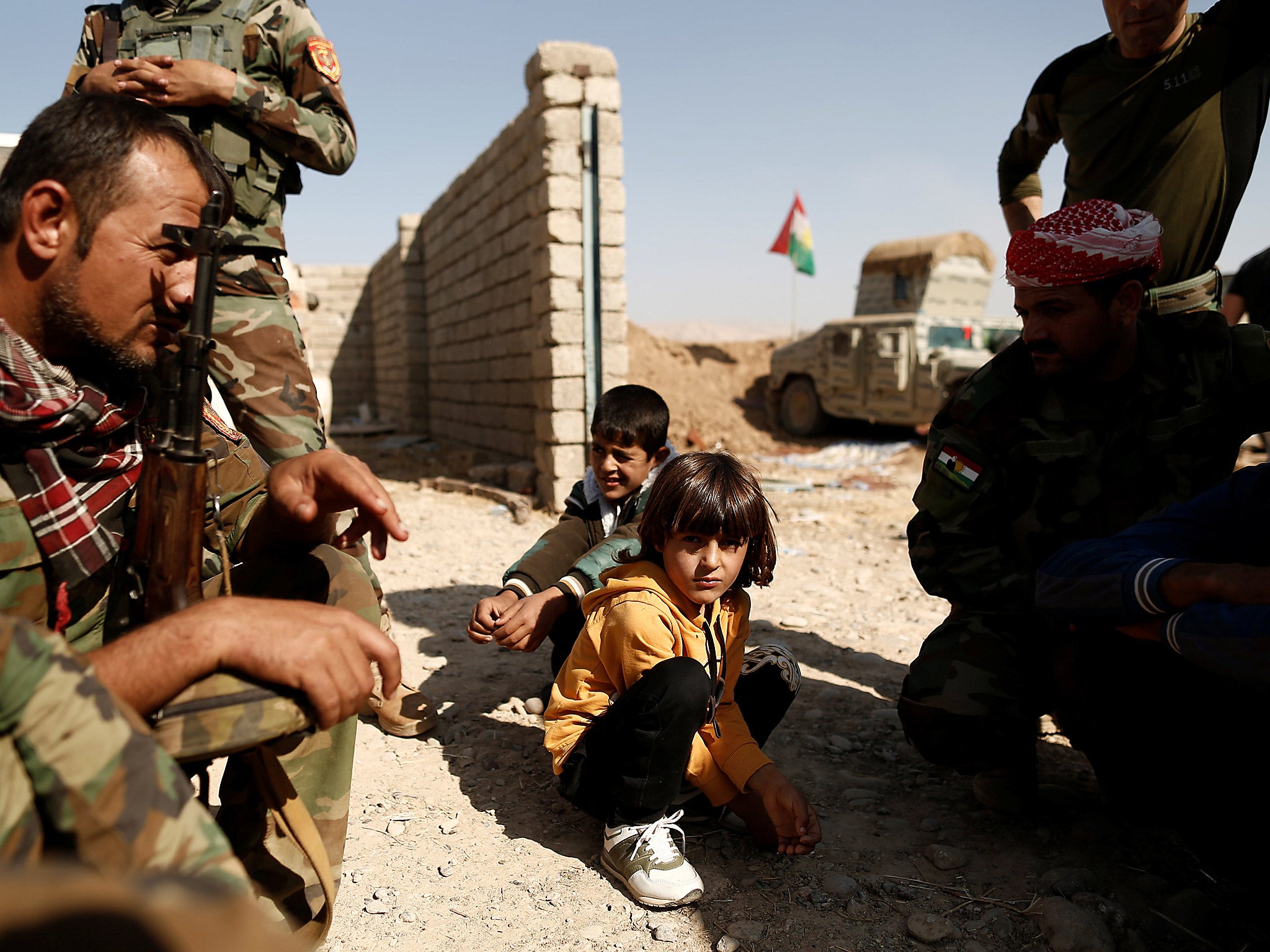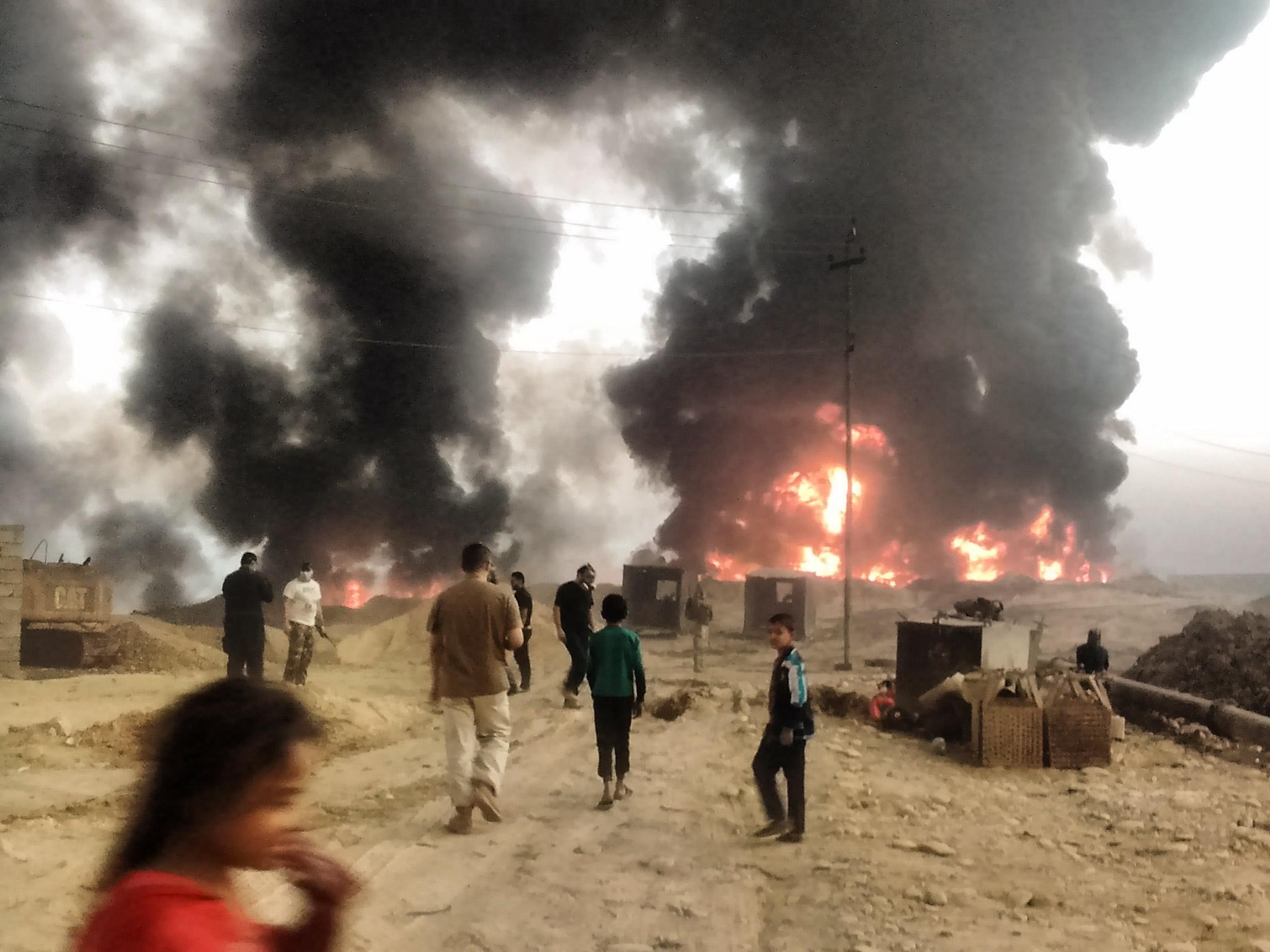Inside the Mosul offensive: The civilians fleeing the battle lines
Exclusive: As the battle against Isis continues, civilians escaping to nearby Qayyarah describe conditions on the front line of the fight between jihadis, the Iraqi army and the federal police

Your support helps us to tell the story
From reproductive rights to climate change to Big Tech, The Independent is on the ground when the story is developing. Whether it's investigating the financials of Elon Musk's pro-Trump PAC or producing our latest documentary, 'The A Word', which shines a light on the American women fighting for reproductive rights, we know how important it is to parse out the facts from the messaging.
At such a critical moment in US history, we need reporters on the ground. Your donation allows us to keep sending journalists to speak to both sides of the story.
The Independent is trusted by Americans across the entire political spectrum. And unlike many other quality news outlets, we choose not to lock Americans out of our reporting and analysis with paywalls. We believe quality journalism should be available to everyone, paid for by those who can afford it.
Your support makes all the difference.Men sit handcuffed and blindfolded under the watchful eye of a black-clad national security officer after escaping from their Isis-held towns south of Mosul hours before. Their towns are under attack by the Iraqi army and the federal police on the southern front of the offensive to wrest the northern city from jihadi control.
Escaping across the battle lines is not easy: Isis abducted “tens of thousands” of civilians to use as human shields and killing at least 232 people on Wednesday, according to the United Nations High Commissioner for Human Rights.
Civilians who fled Isis just days ago told The Independent of militants forcing them to walk further back into Isis territory in front of their vehicles as the battle lines shifted. They executed civilians who tried to flee, and held hostages inside towns and villages to prevent government shelling.
Families desperate for escape risked death – not just from bullets crossing the army front lines, but also from clouds of toxic smoke from oil wells and sulphur fields near Qayyarah, lit by Isis fighters as they retreated.
“When helicopters came to fight Isis the civilians had a chance to flee to other side,” said a 45-year-old man from the town of Shora, 25 miles south of Mosul, who refused to give his name fear of Isis. They came walking followed by their sheep and waving white flags so as not to be confused with the enemy.
At the camp for new arrivals in Qayyarah, security services were busily cross-checking a box of national identification cards with computer lists of known Isis members, gleaned from on the ground intelligence, to weed out any suspects amid the displaced. The eight men who identified on Wednesday remained silent, their wrists tied and were blindfolded with pieces of black plastic. An officer tapped the head of one of the suspects with a pointy stick. The suspect’s T-shirt and flimsy sandals were covered in dust.

The security official, who wouldn’t give his name, said that the suspects would be sent to the local court, and depending on evidence would be jailed. In a war where so many have lost friends and loved ones; human rights abuses, revenge attacks and arbitrary detentions of suspects are not uncommon.
Human Rights Watch has confirmed that the Kurdistan regional government is arbitrarily detaining men and boys fleeing Isis held Mosul and Hawija.
Of the thousands of people displaced by the fighting so far, many are women and children. Men that have avoided capture by Isis must go through a screening process to check they are not militants.
The man who escaped from Shora claimed 75 per cent of the people in his town supported Isis and that resistance against the jihadis was dangerous because of the long reach of Isis intelligence. “They can’t resist Isis because Isis is strong,” he said. He described harsh punishments for minor transgressions such as wearing the wrong length trousers, smoking or using a mobile phone. “For two years I didn’t know what time it was or what day it was because we had no TV, no film.”
When the attacks by the Iraqi security forces began, the Isis morality police left the streets and went to the front lines to fight. Isis stopped being so visible because of the danger of air strikes.
In the town of Qayyarah, south of Mosul, Zedan Khalaf, a retired soldier of 70, told The Independent that Isis shot 42 civilians accused of trying to escape one week before the town was liberated at the end of August. Abdul Kader Yousif, 38, also living in Qayyarah, told how he was caught by Isis smuggling people out of the town seven months ago. As a punishment he was hung up by his hands inside the local Isis security headquarters and regularly beaten with a piece of piping for 10 days.
One man still inside Mosul, who spoke to The Independent by telephone and cannot be named for his own security, described an atmosphere of foreboding about the coming battle.
“There are no fighters on the street and I am trying to stay at home. People are trying to escape, the situation is very bad. I don’t know what will happen.” he said.
Subscribe to Independent Premium to bookmark this article
Want to bookmark your favourite articles and stories to read or reference later? Start your Independent Premium subscription today.
Join our commenting forum
Join thought-provoking conversations, follow other Independent readers and see their replies
Comments